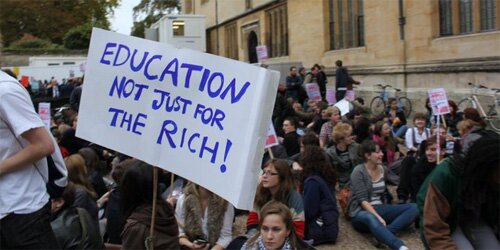What we need is a leap of faith
1:36 pm - January 24th 2009
| Tweet | Share on Tumblr |
This discussion about a ‘British Barack Obama’ has been so overdone even I’m getting tired of it despite having politically obsessed about him for over two years. But there are two points I’d like to make.
I don’t entirely buy Unity’s reasons for why there won’t be a British Obama, neither am I persuaded by Sunder and Sadiq’s emphasis on current representation and stats. On that, I’d like to see a more dispassionate analysis like this on 538. I’m a bit more more influenced by the work I did out there on the campaign.
Obama’s narrative was that America is the land where any dreams are possible and he was the culmination of that dream. He needed them to believe in three things: that he was capable for the job, that America could elect a black man (important during the primaries) and most importantly that they could make that change happen. These were leaps of faiths that were explicitly tied to the ongoing myth-making that is The American Dream.

At around 7pm on Tuesday 4th November, just as the state of Pennsylvania was being announced for Obama, over 200 volunteers were still frantically making last minute calls to Colorado voters encouraging them to hit the polls. Our office in Santa Monica, Los Angeles, was a hive of activity even as victory was unfolding on the TV.
Our team leader, a young South African woman, announced that Santa Monica had made over 42,000 calls that day – a record for an Obama office our size designed to accommodate only 25 volunteers at any one time. And yet over 400 people had streamed through the doors that day – most using their own mobiles, sitting inside cooped up next to each other, sitting outside on the benches – anything to get him elected.
Derided as a piece of fluff by many, “Yes We Can” was more than the belief that a black man could be elected President of the USA. It was a mantra for us working on the campaign that the revolution belonged to us. We would make it happen. As our office poster said: “We Are Change”.
The massive volunteer effort, incorporating nearly 10 million Americans, was all part of the myth-making that Obama focused on. Can you ever imagine that here, now?
We have a Conservative leader who desperately wants to be seen like Obama but can only sell a “broken society” narrative that smacks of typical Tory whining. We have New Labour that was all ambition and hope 11 years ago but has now run out of ideas and keeps passing more pointless laws. The Libdems still don’t have a clear enough narrative. You can hardly blame the people for their apathy.
So here’s my two points:
1) A British Barack Obama’s biggest hurdle would be to inspire a level of confidence that made his / her core supporters believe that the rest of Middle England would also support them. Getting past that level of institutional inertia is difficult, even for white outsiders (Howard Dean, 2004, John Edwards, 2008). To inspire your own people is one thing, to make them believe the rest of the country would also follow suit is more difficult.
To that extent asking whether Britain could elect a black or Asian PM is the wrong question to ask because timing and the conditions are everything. Their race would be irrelevant because he or she would have to be a leader for everyone not just minorities.
2) While Obama’s race was a big issue, much less attention has been paid to the fact he assembled the largest ground-operation ever for an election. Any British counterpart, white or black, would need to do something pretty spectacular to shake people out of their apathy and get out there to pound the streets.
He or she needs them to believe that if they get involved and pitch in, they can help change their country. I think that’s more difficult than getting a minority person in Parliament.
Both these require a leap of faith by Britons, and a high level of myth-making/story-telling/narrative by a politician – things we’re not used to. To give you an indication of what I mean, here’s the video just released by the Obama campaign. Can you see that happening here?
| Tweet | Share on Tumblr |  |
Sunny Hundal is editor of LC. Also: on Twitter, at Pickled Politics and Guardian CIF.
· Other posts by Sunny Hundal
Story Filed Under: Blog ,Our democracy ,Race relations ,Westminster
Sorry, the comment form is closed at this time.
Reader comments
We have a Conservative leader who desperately wants to be seen like Obama but can only sell a “broken society” narrative that smacks of typical Tory whining. We have New Labour that was all ambition and hope 11 years ago but has now run out of ideas and keeps passing more pointless laws. The Libdems still don’t have a clear enough narrative. You can hardly blame the people for their apathy.
*claps*
It really is up to the Lib Dems to pad up and get out to the crease. Cameron doesn’t have the resolve to stick to the optimism plan. A couple of years and he’s back parroting the same old Broken Britain narrative that’s never been successful.
Slippery Dave has no answers to the problems Britain faces. He’s a charlatan.
I just wish Nick Clegg could be braver and start a fire. We’re all waiting.
[Obama] assembled the largest ground-operation ever for an election. Any British counterpart, white or black, would need to do something pretty spectacular to shake people out of their apathy and get out there to pound the streets.
I don’t think British people are apathetic about politics. I do think they are apathetic about political parties.
2. And apathetic about spending time voting and understanding who to vote for, when parties are so similar, in constituencies where their votes just won’t matter.
I just wish Nick Clegg could be braver and start a fire. We’re all waiting.
Nail, head, hit!
One of the reasons you won’t get an Obama type candidate in the UK is because Britain is more party politically driven. People in this country tend to vote right down the ticket either Tory or Labour. From general elections, to local council elections many people vote one party all the time. You could put a lump of shit up for election in many rural areas, and as long as it had a blue badge on it people would vote for it. In fairness , the same applies to Labour as well. Also, too many seats are safe seats for either of the 2 mian parties.
In America, it is not unusual for people to vote one way for Congress and then balance that up with a vote the other way for President. A candidate from either side can suddenly connect with the population and have a good chance of victory.
Also , you tend to have elections won on near 50% or more of the poll in America. Therefore you have t o reach out to a much bigger pool of voters. When was the last time either major party got any where near 50% at a general election in the UK? 50 years ago I bet.
10 million people in the US (at peak) would still only be 3.2% of their population – and I would be interested what counts as ‘involved’ – making a small donation?
Those numbers transposed to the UK would require about 2.2 million people being ‘involved’ in some way, which would be significantly more than the number of people currently registered as members of a political party, even if you include all the trade union affiliates- and not even all those help out during elections.
I think if we had elections for the job of Monarch we could probably expect that sort of level of involvement (remembering that a Head of State is something a lot more special than Prime Minister), but because people vote for parties, not individuals, and the parties are all inspiring, self serving and ultimately distrusted then this idea that a British Obama could be possible is a pipe dream.
I think people do trust and support and want to help individual politicians, but not parties. That’s the problem, if you can call it that. Everyone knows that parties have to pander to a tiny minority of swing voters in key constituencies. It’s a complete farce. A Government can have a huge mandate to do whatever it wants without getting anywhere near 50% of the vote. People are *sick* of this, and no amount of charisma from a leader is going to change that. Even in 1997 when our own messiah Tony Blair took over, turnout was down.
Ah Sally, didn’t mean to repeat a lot of what you said. You posted while I was typing ![]()
Good piece, Sunny.
I also think Charlotte’s point here is spot-on:
Everyone knows that parties have to pander to a tiny minority of swing voters in key constituencies. It’s a complete farce. A Government can have a huge mandate to do whatever it wants without getting anywhere near 50% of the vote.
Changing the voting system could make the world of difference….
[troll]
I see the Liberals and still performing their quaint ritual , .‘Go back to your constituencies and prepare for tea ‘…or something . If it ever happened they would hate it .The Liberal Party is a vehicle precisely for people who think they are cleverer than everyone else . The whole point is not to indulge in the rather grubby business of building a broad constituency . That would mean having to fudge and negotiate with your values aka….”Grow up” ? . Not they , they will forever crow in Neverland .
David Cameron is the Cinderella whom the Obama slipper fits , surely with Brown and Clegg as tghe ugly sisters (. I would hardly expect Red Hundal to appreciate him but then Red Hundal is a hard left extremist agitator who could not get a majority in his mum’s house ..)
The Boy King David was the only outsider .He was the only one who was not supposed to win .He was the one who spoke to his Party told them what they did not want to hear and changed them .Suddenly it was obvious he was right . The other two are a time serving No.2 and yes man but David Cameron showed some balls and since then enormous political skill . Every time he gets exposure the Conservative Party go ahead he is able to move far into Liberal territory without losing the trust of the Party because he has found a way to grow from Conservative resources . This is a stunning political achievement and an impartial observer would accept that .
Naturally Cameron’s light and gravity will not be felt in this cold dark place of wailing but elsewhere the effect is actually more dramatic than the Obama thing .Time for change , time for change , somewhere inside you know that more Brown is just not an option.
As to this leap of faith thing well the Conservative Party did that already with Thatcher .If the right man or woman come along skin pigment would be of no greater concern . Thus far the right man has not arrived but in time I am sure he will ( or she etc.).
New/old mania you to talk some rubbish.
This is the longest period of time the Tory party has been out of power for nearly 100 years. Most Tories believe they have a divine right to rule, viewing the other parties not just with contempt, but also as un British.
Cameron is not as popular as Duncan Smith with the Tory party, but so desperate are they for power they go along with his green wash bullshit. Not that they need to worry, because once he wins, I bet he will tack hard to the Right just like Bush. He is another compassionate Conservative bullshiter.
The censensus appears to be that the voting system is a problem. What would be a better votinbg system? I don’t like closed party list systems, where the parties decide what order their candidate appear on the list, and therefore decide who gets elected — the whole point of representative democracy is that the voters are supposed to decide who gets elected, not the bloody politicians.
STV is nice though.
think to have a leap of faith, one needs to have faith!
can’t see the Brits having faith in the world of politics.
Another good reason why it will be very difficult for Britain to produce a Barak Obama was amply illustrated by the severe mauling which David Lammy got on this site. With the notable exception of the editor, most of the posters refused to listen to a black MP, hailing from the area he represents and who has had to find a way to engage at least a part of that community to ensure his election and re-election. As a Tottenham resident I felt a lot of his comments were not only sensible but addressed issues which all political parties ought to be considering if they are at all interested in their futures. I’m not suggesting that David Lammy is a potential Obama but the vivious mauling he got on this site will make not only him but also other black politicians hesitate before trying to engage even supposedly friendly sites. Your are all too clever and smug and should realise that politics is not just about who you would like to invite to your dinner party.
The voting system won’t be amended until there is a real head of steam for change, equivalent in weight to the Scottish Constitutional Convention. We have to persuade the Labour and Conservative Parties to do something that is not in their own interests.
The Lib Dems are also part of the problem – to the extent that they are the obvious beneficiaries, any such campaign is going to look like a “Trojan Horse”.
It might be best to start in local government – in London, the 2010 borough elections come to mind. In those boroughs where the Tories are digging in, or have done so, such as Wandsworth, Hammersmith or Enfield, might there not be a case for a single slate of anti-Tory candidate in each ward: a Borough Convention could determine how many would be Labour, Lib Dem, Green or independent. If the parties wouldn’t play ball, it would expose them as being concerned with their own organisational needs first and the interests of the people second.
As Mike says @14, the question is less “what would be a better voting system” (Cabalamat@11)- but how to get one politically. Those in favour of electoral reform love discussing their favourite systems in endless intricate detail and disagreeing about it. The question which is usually overlooked is how could electoral reform be achieved, and what coalition-building strategy could do it.
I wrote an essay in Autumn 2007 ‘How To Reform The Electoral System’ arguing that all serious reformers should agree to back any plausible pluralist reform which would make it. “Put three electoral reformers in a room and they might propose four different voting systems. The Independent Commission on the Voting System, chaired by Roy Jenkins, appointed to clear up this internecine struggle, surveyed every electoral system ever used anywhere and invented a new hybrid of its own. Reformers who adopt a theological insistence on a particular system guarantee their own defeat”.
http://fabians.org.uk/publications/extracts/call-for-lab-libdem-deal-on-alternative-vote
I have been a supporter of PR for a very long time. But looking at the strategies for reform led me to the conclusion that a reform package (Commons Alternative Vote; Lords full PR; probably PR for local government) and compromise was achievable and could break this deadlock. I can not see a plausible route or strategy to full PR (certainly not without PR advocates achieving a Scottish Constitutional Convention scale civic mobilisation, of which there is no sign whatsoever) but am happy to back that if
This strategic argument has won some interesting converts. Stuart Weir (a strong PR advocate and STV supporter) initially wrote a scathing post saying that the conclusion was like selling a dodgy used car (“It has advantages over FPTP, as Sunder sets out, but is this the comparison we should be making? If I am replacing an old banger with dodgy steering, would I buy a car that tends to steer worse just because it suits the sales person?”). But after a seminar on reform strategies among electoral reform campaigners and some senior political voices from Labour and the LibDems, he wrote that he had changed his mind about AV as an “ice-breaker”; that was the general view among many of the reform campaigners at the meeting
http://www.opendemocracy.net/blog/ourkingdom-theme/stuart-weir/2008/06/20/should-supporters-of-electoral-reform-back-av
The Electoral Reform Society (which backs STV) has long been very critical of AV. In an interesting report late last year – A Better Alternative? What AV would mean for Westminster. Its research director Lewis Baston – among the best informed writers on elections – looks at the detailed case for PR supporters backing AV, concluding that it is a better system than PR supporters have acknowledged and that, on balance, it is not just the most plausible short/medium-term reform but could prove a staging post to full PR, by making electoral reform a reality.
“Even if AV ends up sticking for 20 years (or 30, or 50) before the next stage, it is worth doing. That would amount to decades under a better system, more possibilities of further reform, and
bringing electoral reform of the House of Commons into the realm of the art of the possible”.
The full Baston publication (PDF) available from this page
http://www.electoral-reform.org.uk/article.php?id=9
Both generally, and from an LC point of view in particular, the most important effect of AV is . perhaps less the distribution of seats but that it creates an inherently pluralist and cooperative and coalition-building approach among parties and candidates: no wasted votes, the dilemmas of “tactical” voting abolished in that it becomes an inherent part of the system. Under the present system, progressive parties and candidates can not easily cooperate or form alliances. Introduce transferable voting and AV, and that would change.
[15] Thanks, Sunder. I agree that AV is an easier “sell” (retains single-member constituencies, and only the candidates who top the poll are elected – the Yanks call it “instant run-off” which strikes me as a more marketable name) but I remain to be convinced that it’s a much better matcher of votes to seats than FPTP.
I expect an absolute smash for the “left” at the 2010 election with Labour losing more seats than it did in 1983, the Lib Dems being reduced to near their 1992 level and a handful of strong 2nd places for the BNP – don’t think they can win a seat yet, but may well win a Parliamentary by-election during the course of the Parliament. Labour will elect Harman to lead them in Opposition and she will be totally ineffective and subject to plots etc from the off.
In this situation, the strategy of building alliances at local level has much to commend it. For example, suppose the Labour, Lib Dem and Green parties agreed not to oppose each other in Wandsworth at the next elections. Based on 2006 vote share Labour would field 30 candidates, the Greens 17 and the Lib Dems 13. (No doubt other factors would influence the final distribution, and there is always the headache that one ward is a Lab/Lib Dem marginal.) Well, it may not happen next time – the General Election will be held on the same day in all probability, but I reckon some variant on a “common front” approach of this type will become necessary as the political centre of gravity moves ever rightwards.
Are you suggesting that it would be a good thing for voting to be based around myths / stories / things which are potentially untrue, or at least unknown, rather than actual concrete policies and ideals? It’s worked out well in this case, but if you start relying purely on oration and charisma, you’ll not necessarily end up with a British Obama: let’s not forget how well this tactic was exploited by the knowledge-free Palin at some points during the campaign. Some first hand accounts I’ve read of the grassroots organisation, yours above included (although I realise that the point of this article isn’t to tell people what’s good about Obama), seem to be a little hazy on the actual reasons why he’s is worthy of so much support – I certainly think that he is, but a reasonable amount of the analysis (particularly the emphasis on change) seems to rely on the cartoonish incompetence of Bush / McCain or the excitement of feeling as though you are part of social change as much as what that change is, why it is important or what it is Obama would actually do. I’m not suggesting that people didn’t know why they supported Obama or anything like that, the point I’m trying (somewhat laboriously) to make, is that I think that ‘he convincingly says he’ll change things’, is a very different and much worse reason to vote than ‘I think he’ll close Guantanamo / implement a fairer tax system / be on the same side as me in social issues etc’ and it seems to be the former that you’re saying is desirable.
I think we can clearly see that PR is a ruse designed to exclude the largest Party , the Conservative Party , from power. I see my inoffensive post has been deleted which just about sums it up.
If Liberals and Labour try to force PR on the country Conservatives will have no choice but to take England out of the Union rather than be ruled by a perpetual Lib lab Pact who , on issue after issue are the very opposite of expressing the wishes of the country.
I would support a PR House of Lords as a way of stopping tactical voting though. Then therewould be less need of Party cooperation , a vile idea, and more need for people to make their minds up.
I find it easier to imagine a Barack Obama-figure as Mayor of London, than as PM: the more-or-less direct mandate of the London Mayor has already encouraged parties to be imaginative, or candidates to takes risks. Livingstone got a first-term win despite/because of running as an independent, and then there’s Boris Johnson…compare that to the mechanisms and machinations required to get to be leader of your political party, let alone PM (Thatcher became Tory party leader because she was the ‘Stop Ted Heath’ candidate rather than any commitment to gender equality) The voters don’t decide who gets to be PM under the UK system, PR or no PR – and the mayoral elections don’t use FPTP.
PS: The results of PR can be (ab)used to exclude any political party: in Italy it was the socialists and communists; in Germany the FDP/CDU/CSU kept the Social Democrats out of power. It’s called building a coalition government.
Generally PR favours the left because a large part of the lefts vote is directly paid for by the state whether or not the recipients have any view about whether this is right or not. That is why, despite the fact there us a large Conservative majority on a whole range of non economic issues, law and order, marriage, immigration, most noticeably , the Parties who oppose the majority form a theoretically larger block.
In practice these conservative elements are controlled in the Labour Party by basically class advantage. Add that to the Liberals, remove the electorate from the equation except at a remove and you have a progressive majority built out of a country where a majority detest progressives . Europe and international aid are good examples of the fault line and look at the way the ruling elite behaved about that. Those voting with perceived economic advantage can easily be bribed to stay in line .Further more you give yet more power to the group who are already vastly over mighty the centre left middle classes themselves for the most part Public Sector beneficiaries and rarely wealth creators .
Those who are under attack from these elements ie middling tax payers form a smaller group . Their advantage is that they are more cohesive because it is a genuine group and not a con. PR opens the door to limitless predation on these tax payer and abuse of the conservative majority . PR would lose a vote , it is a shameless immoral assault on democracy and the fact that those who are relatively happy to be managed , on the continent like it is not comfort . The British will never give up their right to kick the bastards out .
Generally PR favours the left because a large part of the lefts vote is directly paid for by the state whether or not the recipients have any view about whether this is right or not.
Hey, ‘mania – what part of Helmut Kohl’s period in office did you miss to come up with that assertion?
RP there are always going to be local differences ,Boris after all was able to win in London despite a system designed to stop excatly that . I have a Comparative International study at home published in Prospect about the tendency for the left to be more various and the right more cohesive . I may look it out if I get the time .It clearly fits our country well when you have a leftish Centre Party to start with .
My point is that it would result in a an electorate that does not represnet the views of the country and for reasons that have nothing to do with democracy. Add to that the fact it could not get through a democratic process itself and the added importance of politicians and PR is a thing of evil.
Imagine the referendum. It would be lost but if you do not think so by all means bring it on …as if …and if we got it thats the end of Scots voting in Westminster anway and we could change it back. You are opening a can of worms
RP there are always going to be local differences
As in ‘local differences’ that prove you’re wrong? (I’d add that the use of ‘top-up’ seats in the Scottish system was originally the only way that the Tories had any presence in the Scottish Parliament after they were wiped out under FPTP for Westminster in 1997) The existence of one big centre-right party and a splintered left wing still doesn’t support your case that ‘[g]enerally PR favours the left because a large part of the lefts vote is directly paid for by the state’ – I’m not opening a can of worms, I’m just taking the trouble to suggest your argument against PR is – how to put this? – plain wrong.
Reactions: Twitter, blogs
Sorry, the comment form is closed at this time.
NEWS ARTICLES ARCHIVE























